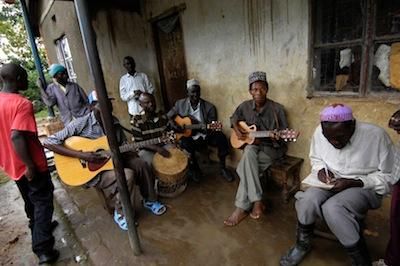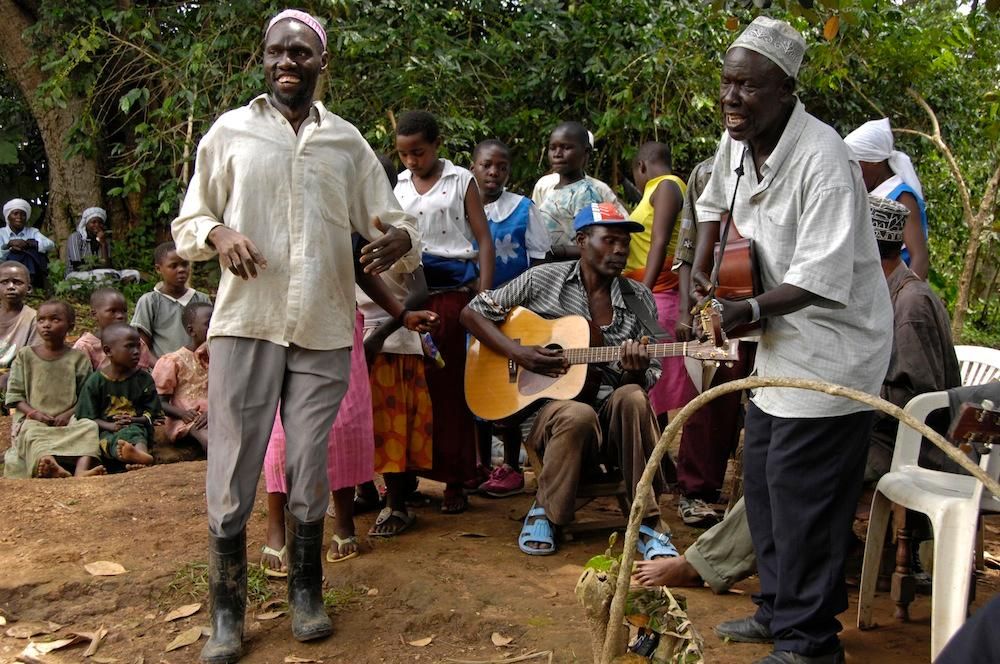Give the World a Cup of Joe and Teach It Harmony
Musicians in a fair trade coffee cooperative hope to change the world through song and coffee
/https://tf-cmsv2-smithsonianmag-media.s3.amazonaws.com/filer/4e/ed/4eedca52-20d6-4d8c-83d2-07b3d95cd99e/sfw50417_900.jpg)
On September 11, 2001, Ugandan coffee farmer J.J. Keki was visiting Manhattan on a lecture tour to talk about the Abayudaya, his Jewish community in Uganda. After the terrorist attacks that day, he returned home and organized Jewish, Christian and Muslim neighbors into a fair-trade coffee cooperative, Mirembe Kawomera (“Delicious Peace”), with the belief that in a time of war and violence, people must do everything they can to spread messages of peace. Music is an essential part of Ugandan culture and coffee growers often sing about their experiences in the field, so the cooperative began composing songs that extolled the social and economic virtues of their interfaith project. Soon guitar groups and choirs of farmers around the region were singing the benefits of their collective efforts.
Jeffrey A. Summit, a music professor at Tufts university, traveled to Mbale to record the cooperative’s songs, 16 of which he has compiled on Delicious Peace: Coffee, Music & Interfaith Harmony in Uganda, out April 9 on Smithsonian Folkways Recordings. In the interview below, Summit discusses the messages of peace, and what the growers have to teach every coffee-drinking American.
How did this album come together?
I started working with the Abayudaya (Jewish) community in Uganda in 2000. After I finished the Smithsonian Folkways album Abayudaya: Music from the Jewish People of Uganda, I went back for three additional research trips that specifically concentrated on Mbale’s Delicious Peace Fair Trade cooperative. All the tracks were live field recordings in the deepest sense of the word, taken in the middle of coffee fields, or in little villages or religious buildings.

What styles of music are represented on the album?
The collection represents a range of musical styles, from women’s choirs to village guitar music to traditional Ugandan music, which uses instruments like the endingiri, a one-string tube fiddle.
What are these songs about?
In East Africa, as in much of Africa, music plays an essential role in community education. These songs are used to spread specific messages. Many of the songs teach people how to plant and process coffee. The quality of coffee very much depends on the careful way that it’s picked and harvested, so the songs stress things like “put the coffee up on a raised stand to dry so the goats won’t pee on it.” The farmers also sing about the economic benefits of fair trade to get more farmers to join them. Increasing the production power of the cooperative helps them get money to send kids to school, to buy clothes, to get medical treatment. And a third part of the message is about the benefits of interfaith cooperation. Delicious Peace is a Jewish, Muslim and Christian cooperative, and the farmers sing about how respect between these different religions brought peace and prosperity to their community.
What do you hope listeners will take away from this record?
Americans are so strongly connected to the coffee they drink in the morning, but they don’t see the human beings behind their cup of coffee. One of the things I learned again and again in the course of my research was that there’s no mechanized way to harvest good quality coffee. A coffee farmer has to walk into the fields, look at the coffee tree, discern what cherries are ripe that day, pick them, and then go through a whole complex process of sorting, pulping and drying them, in addition to transporting them many kilometers on their backs or on a bicycle to offices. I hope this music will be a way for us to experience the humanity of the people without whose labor there wouldn’t be a cup of coffee in front of us in the morning.
Also, the music rocks. Lots of people don’t listen to this kind of traditional music, so I hope the fact that the album has a compelling story around it brings people to these wonderful songs, which are really very typical to the styles of music played in this part of Uganda.
What is your personal connection to the music?
Being connected to this cooperative and understanding its farmers’ lives through these songs has given me real sense of hope that people are able to bridge differences to address very difficult issues. So many people responded to 9/11 with xenophobia or a sense of powerlessness. Yet you had these Ugandan coffee farmers coming forward to say, “our response to 9/11 is that we have to use whatever we have to teach the world to live in peace. We have coffee, so we’ll use coffee to teach peace to the world.” This tremendously creative, hopeful and empowering message has had a great impact on me.

CORRECTION 3/25/2013: Delicious Peace will be released on April 9, not March 26 as this article previously stated.
/https://tf-cmsv2-smithsonianmag-media.s3.amazonaws.com/accounts/headshot/paul-bisceglio-240.jpg)
/https://tf-cmsv2-smithsonianmag-media.s3.amazonaws.com/accounts/headshot/paul-bisceglio-240.jpg)